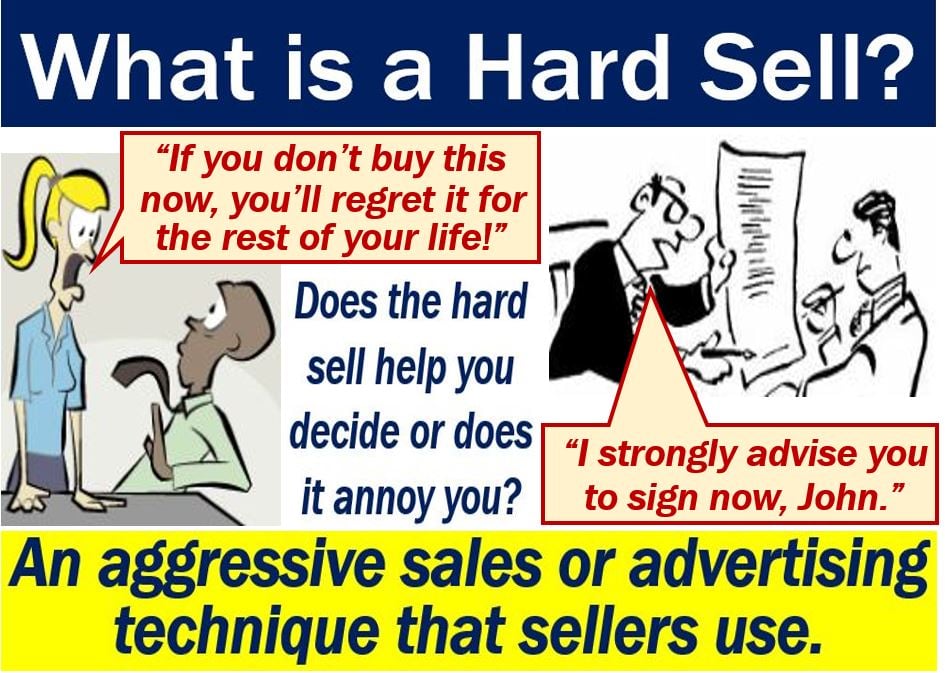The hard sell a is type of selling in which the seller tries hard to persuade a potential customer to purchase something. We also call it hard selling or high-pressure selling. The seller applies psychological pressure to persuade the potential buyer to make a quick purchase decision. We often refer to the potential buyer as the prospect.
For example, the seller may appeal to the prospect’s fears, vanity, or greed.
Sellers who use the hard sell say that they have to because potential buyers tend to postpone making decisions. In fact, they will even postpone making a purchase decision when it is in their best interests to buy now, sellers argue.
When companies adopt a hard sell in advertising, they use a more direct and forceful message.
Hard sell vs. soft sell
The hard selling technique contrasts with the soft sell. With a soft sell technique, the seller tries to persuade the prospect gently. Sellers do not put a lot of direct pressure on people to purchase things there and then.
Some advertisers and salespeople use the soft sell technique. They use subtle language and a non-aggressive approach.

The soft seller aims to avoid upsetting the prospect. Put simply; the seller does not want to push away the potential buyer.
The soft sell is more common than the hard sell when the seller has to make several visits to get a sale. In other words, the seller aims to come back and talk to the prospect again.
Hard sell- pros and cons
There are both advantages and disadvantages to using high-pressure selling tactics.
Pros
- The advantage of immediacy plays a key role in the hard sell concept. That is why so many salespeople and advertisers use this approach.
- With a direct and blatant approach, the prospect is more likely to purchase the product there and then. In mail order ads, for example, the advertiser tries to encourage the reader to fill out the form immediately.
- With a hard selling approach, some sellers believe they save time. Consequently, they argue that they sell more.
- It is an easy formula and is mass-producible. This means that a sales manager can train a team of new salespeople rapidly.
Hard sell – cons
- The tactic may alienate some prospects. In other words, many people find it off-putting.
- The high-pressure tactic may overwhelm the potential buyer to such an extent that they turn off completely.
- The sellers may find it hard to get repeat sales from the same customer. This is because the customer does not want to face that pressure again.
- Many prospects complain about the lack of creativity in hard sell adverts and sales tactics. Subsequently, they never acquire intrigue towards whatever the seller is trying to get them to buy.
When to use the hard or soft sell
Whether a company uses a soft sell or hard sell approach depends on what they are selling. It also depends on the company’s set up and the goal of the salespeople or advertising agency.
Imagine that Mary Smith works in a shoe shop selling shoes. A prospect comes in looking for women’s shoes. Ms. Smith learns that the prospect is from another country and is leaving tomorrow.
Ms. Smith knows that if that prospect does not buy today, she will probably never buy from her shop. Therefore, Ms. Smith opts for the hard sell. She wants the prospect to buy there and then.
In a seller’s market, salespeople do not need to use high-pressure selling tactics. In a seller’s market, demand is much greater than supply, i.e. the sellers call the shots.
